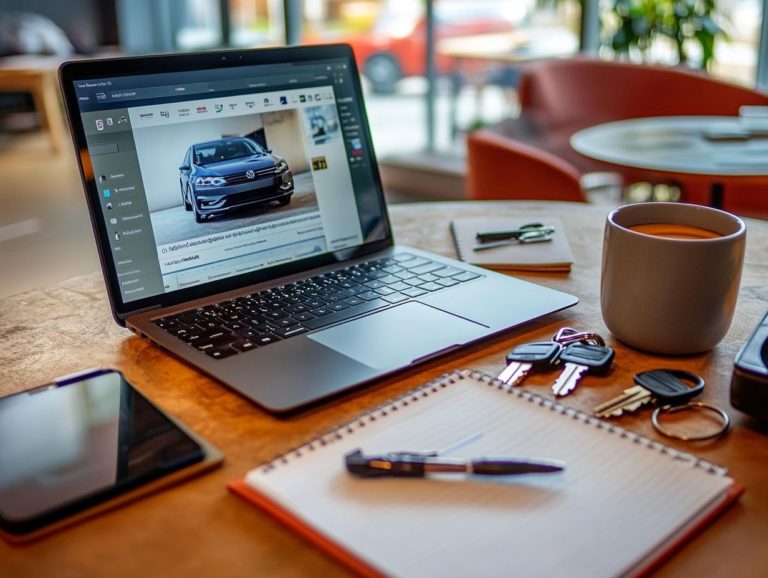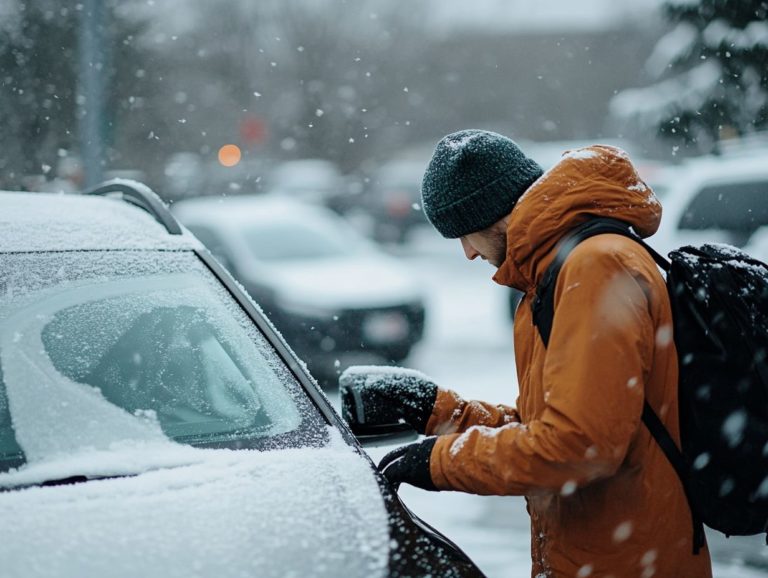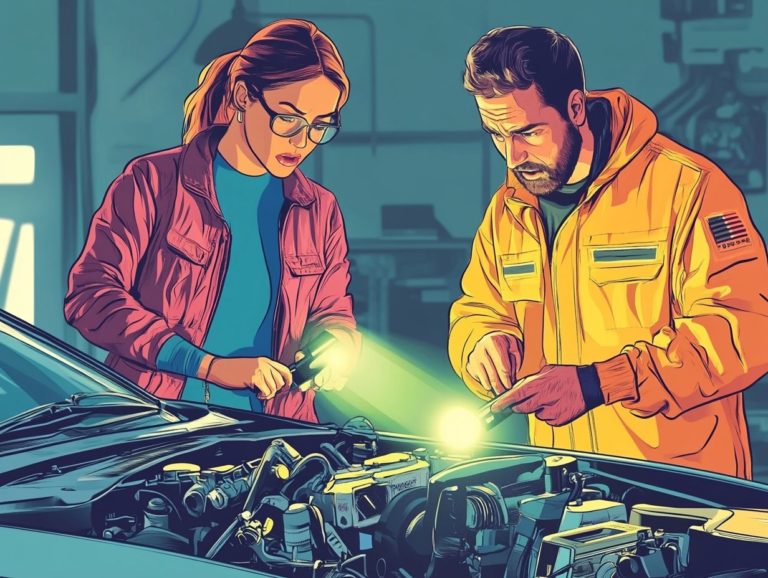5 Tips for Buying a Used Car from a Dealer
Buying a used car can evoke a blend of excitement and apprehension, particularly as you navigate the vast array of options available at dealerships.
Get ready to discover five powerful tips that will transform how you buy a used car! This article provides essential guidance ranging from conducting thorough research to negotiating the best price. It delves into the benefits and drawbacks of purchasing from a dealer, highlights crucial questions you should ask, and identifies potential red flags that could signal trouble.
By the end, you will be equipped with the knowledge needed to make a confident and satisfying purchase that aligns with your needs and expectations.
Contents
- Key Takeaways:
- 1. Arm Yourself with Knowledge: Do Your Research!
- 2. Don’t Delay: Check the Vehicle History Report!
- 3. Experience It Yourself: Take a Test Drive!
- 4. Negotiate the Price
- 5. Have a Mechanic Inspect the Car
- What Are the Advantages of Buying a Used Car from a Dealer?
- Frequently Asked Questions
- What are the top 5 tips for buying a used car from a dealer?
- Is it better to buy a used car from a dealership or a private seller?
- What should I look for in a used car from a dealership?
- Can I negotiate the price of a used car from a dealership?
- What are some red flags to watch out for when buying a used car from a dealership?
- Should I get a warranty for a used car from a dealership?
Key Takeaways:

- Do your research before visiting a dealer to have a better understanding of the car’s market value and potential issues.
- Always check the vehicle history report to ensure there are no major accidents or red flags.
- Take a thorough test drive to evaluate the car’s performance and see if it meets your needs.
1. Arm Yourself with Knowledge: Do Your Research!
Conducting thorough research is essential when you re considering the purchase of a used car. It equips you with the knowledge needed to navigate the various financing options, assess the total sales price, and evaluate dealership reputations.
Understanding the nuances of financing is key. It allows you to pinpoint the most manageable monthly payments and potential interest rates. A well-structured Buyer s Guide, which outlines critical factors like vehicle history, common issues tied to specific models, and savvy negotiation tips, can be your roadmap.
Evaluating dealership reputations through online reviews and tapping into recommendations from friends or family can yield valuable insights. To effectively compare prices, leveraging online resources such as pricing tools helps you gauge fair market values and secure the best deals, ultimately maximizing your investment.
2. Don’t Delay: Check the Vehicle History Report!
A vehicle history report is a critical tool for any used car buyer. It offers key insights into the car’s past, such as safety recalls, maintenance records, and potential warranties that come with the car that can safeguard your investment.
Securing such a report is a breeze, particularly with user-friendly services like Carfax. To begin, simply input the vehicle identification number (VIN) online, and within moments, you’ll have essential details at your fingertips.
As you review the report, focus on any recorded accidents, title status, and significant repairs. These elements can signal potential mechanical issues or safety concerns you may encounter. Understanding this history not only gives you the power to make an informed purchasing decision but also ensures you’re aware of any red flags that could influence your ownership experience.
3. Experience It Yourself: Take a Test Drive!
Taking a test drive is a crucial step in your used car buying journey. It allows you to assess the vehicle’s condition, spot any mechanical issues, and experience the effectiveness of safety features firsthand.
During this vital evaluation, pay attention to how the car handles during both acceleration and deceleration. Observing its responsiveness in various driving situations like sharp turns or sudden stops can reveal a lot about its mechanical health.
Listen for any unusual noises, such as rattles or squeaks, which might hint at underlying issues that aren t immediately obvious. Don t forget to experiment with the safety features, like lane departure warnings and braking systems, to gauge their reliability.
Testing the vehicle under different conditions whether cruising on highways or navigating rough terrains will help ensure it performs consistently, giving you peace of mind for all your future adventures.
4. Negotiate the Price

Negotiating the price is vital when buying a used car. It gives you the power to use your research on trade-in values and current interest rates.
This knowledge helps you secure favorable monthly payments and a reasonable down payment. Prepare thoroughly for discussions to enhance your negotiation outcomes.
Familiarize yourself with loan length and fees. By understanding these details, you can express your needs clearly, reducing the risk of unexpected costs.
Knowing your budget and desired vehicle specifications strengthens your negotiation position. View negotiations as a collaborative process to build rapport with the seller.
5. Have a Mechanic Inspect the Car
Having a mechanic conduct an independent inspection of the used car is an invaluable step. It provides a detailed inspection report highlighting potential mechanical issues and estimated repair costs, giving you the power to make an informed purchase decision.
This thorough evaluation reveals existing problems and pinpoints wear and tear that could lead to future complications. With this information, you can negotiate repairs or even the purchase price, ultimately saving yourself money in the long run.
The inspection report typically covers essential aspects like the condition of the engine, brakes, transmission, and any signs of rust or damage. Understanding these elements allows you to make a more confident choice and avoid unexpected expenses from sudden repairs after the purchase.
What Are the Advantages of Buying a Used Car from a Dealer?
Buying a used car from a reputable dealer offers numerous advantages that enhance your experience. You gain access to warranty coverage, a variety of financing options, and robust consumer protection measures, which are often absent in private sales. To ensure a positive buying experience, consider following tips for a smooth new car purchase.
Reputable dealers typically offer service contracts, ensuring that necessary repairs are covered for a specified period. This provides peace of mind, especially if you have reservations about the reliability of a pre-owned vehicle.
Additionally, the commitment to consumer protection laws shields you from misleading practices and ensures that the vehicles meet specific safety and quality standards. This assurance protects you from potential risks and hidden costs, making it a savvy choice for discerning buyers.
What Are the Disadvantages of Buying a Used Car from a Dealer?
While there are certainly benefits to purchasing a used car from a dealer, be aware of potential downsides. You might encounter high add-ons that inflate the total sales price and reduced flexibility in negotiations compared to private sales. It’s important to know what to expect from a used car dealer to make an informed decision.
The presence of dealer markups can create a frustrating environment, leading to prices that are significantly higher than expected. There’s often pressure to accept additional services like extended warranties and gap insurance, which may not be necessary.
These add-ons can obscure the true cost of the vehicle, leaving you confused and disappointed. As a result, you might feel like you overpaid and missed genuine negotiation opportunities, ultimately tarnishing your buying experience.
What Are the Questions to Ask the Dealer?

When you re engaging with a car dealer, it s crucial to ask the right questions about the car’s condition, warranty details, and inspection fees. This is essential for clarity and transparency throughout the purchasing process!
Armed with the right queries, you can uncover deeper insights into the overall value of the vehicle you re considering. Asking about the car’s history is important find out if it has been in any accidents or has outstanding recalls. These factors can significantly impact its long-term safety and performance.
Equally vital is understanding the specifics of warranty coverage. Questions about what s included and how long it lasts can help you avoid unexpected repair costs later on. Make sure to establish any written agreements regarding repairs or services promised by the dealer to protect yourself from unforeseen expenses down the line.
Each of these questions acts as a building block for making an informed purchase. You won t be left in the dark once the deal is sealed!
What Are the Red Flags to Look Out for When Buying a Used Car?
Identifying red flags during your used car buying journey is essential. Watch for signs like irregular vehicle identification, missing maintenance records, and unresolved consumer complaints. These can signal potential issues or hidden mechanical problems.
Stay vigilant for signs of previous accidents; mismatched paint or uneven panel gaps often indicate past damage. If you encounter missing documentation titles, service records, or history reports this raises serious concerns about the vehicle’s past and authenticity.
It’s crucial to verify whether the used car has any safety recalls that haven t been addressed. This not only jeopardizes your safety but could also lead to costly repairs down the road.
By proactively addressing these issues, you can secure a more reliable and safer used car purchase!
How Can You Protect Yourself When Buying a Used Car from a Dealer?
Protect your investment when buying a used car from a dealer! Know your consumer rights and review the purchase agreement carefully. Additionally, consider following some tips for negotiating used car prices and inquire about the return policy along with any applicable cooling-off periods.
Take proactive steps to verify the dealer’s credentials by checking for proper licensing and browsing customer reviews. Additionally, consider following tips for finding honest used car sellers. Familiarizing yourself with local laws that safeguard consumers in automotive transactions is crucial to ensure your rights are respected.
Be diligent in asking detailed questions about the car’s history and any previous accidents. Understand the terms of the purchase agreement including warranty options to empower yourself in making informed choices.
With thorough research and open communication, you can enjoy a secure and satisfying car-buying experience!
Frequently Asked Questions
Here are five essential tips to help you navigate the used car buying process confidently!
What are the top 5 tips for buying a used car from a dealer?

1. Do your research: Before visiting a dealership, research the make and model of the car you’re interested in. This will help you understand how to prepare for buying a used car and give you a better understanding of its value and what to expect from the dealership!
2. Check the vehicle’s history: Ask the dealer for the car’s history report, which will show any accidents, repairs, or other important information that could affect its value.
3. Test drive the car: Never purchase a used car without test driving it first. This gives you a feel for the car’s condition and any potential issues, and helps you avoid hidden fees that may arise later!
4. Negotiate the price: Don’t be afraid to negotiate the price with the dealer. Utilize your research and the car’s history to justify a lower price, and consider following tips for evaluating car dealerships to enhance your bargaining power.
5. Get it inspected: Before finalizing the purchase, consider following these 5 tips for buying a used luxury car and have a trusted mechanic inspect the car for any hidden issues that the dealer may not disclose.
Ready to find your dream car? Start your journey today!
Is it better to buy a used car from a dealership or a private seller?
There are pros and cons to both options.
Buying from a dealership may give you more peace of mind with a warranty and potential financing options. However, buying from a private seller could potentially save you money. Just be sure to thoroughly research the car’s history and have it inspected by a mechanic.
What should I look for in a used car from a dealership?
Finding the right used car can be thrilling! Aside from the make and model, it’s important to check the overall condition of the car.
Look for any signs of wear and tear, rust, or damage. Pay attention to the mileage and ask about any previous repairs or maintenance.
Can I negotiate the price of a used car from a dealership?
Yes, it’s always worth trying to negotiate the price of a used car from a dealership. Act quickly, as great deals can slip away fast!
Use your research and the car’s history to justify a lower price and don’t be afraid to walk away if the dealer isn’t willing to negotiate.
What are some red flags to watch out for when buying a used car from a dealership?
Some red flags to watch out for include high-pressure sales tactics and a lack of clear information about the car’s history.
A refusal to allow a test drive or inspection is also concerning. Trusting your instincts is crucial don t settle for less!
Should I get a warranty for a used car from a dealership?
It’s always a good idea to have a warranty for a used car, especially if it’s from a dealership.
Make sure you understand the terms and conditions of the warranty before signing any agreements. Consider purchasing a used car that has been inspected and approved by the manufacturer, which typically comes with a warranty.






